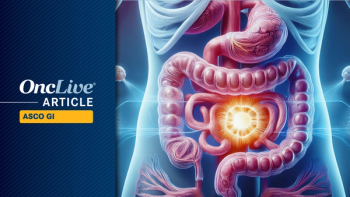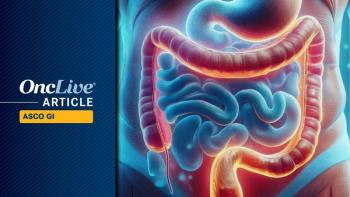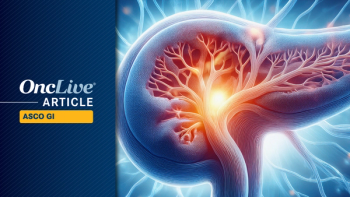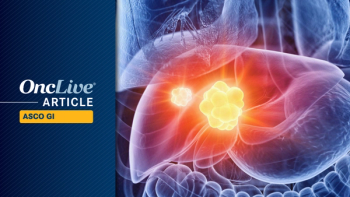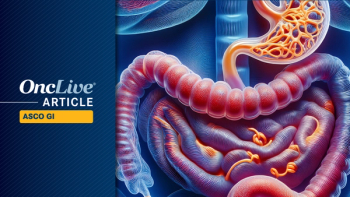
Telotristat Etiprate Curbs Carcinoid Syndrome in Neuroendocrine Tumors
Treatment with telotristat etiprate reduced the average number of daily bowel movements by up to 35% for patients with carcinoid syndrome that was not adequately controlled by a somatostatin analog.
Matthew H. Kulke, MD
Treatment with telotristat etiprate reduced the average number of daily bowel movements by up to 35% for patients with carcinoid syndrome that was not adequately controlled by a somatostatin analog, according to results from the phase III TELESTAR trial presented at the 2015 European Cancer Congress.
Patients treated with oral telotristat etiprate at 250 mg experienced 1.71 fewer average daily bowel movements compared with a reduction of 0.87 in the placebo arm (P <.001). Those treated with a 500 mg dose of telotristat etiprate experienced 2.11 fewer average daily bowel movements compared with baseline. The therapy was well tolerated, with fewer adverse events (AEs) seen in the 250 mg arm compared with placebo. Those in the 500 mg arm experienced a higher rate of AEs compared with the placebo and 250 mg arms.
“Telotristat etiprate represents a novel approach by specifically inhibiting serotonin synthesis and, as such, is a promising potential new treatment for patients whose lives can be significantly impacted by this debilitating condition,” lead investigator Matthew H. Kulke, MD, director, Program in Neuroendocrine and Carcinoid Tumors, Dana-Farber Cancer Institute, said in a statement. “These results are exciting from both an efficacy and safety perspective for carcinoid syndrome patients.”
The phase III study enrolled 135 patients with metastatic neuroendocrine tumors and a documented history of inadequately controlled carcinoid syndrome (defined as ≥4 daily bowel movements). Patients were randomized to receive oral telotristat etiprate three times per day at 250 mg (n = 45), 500 mg (n = 45), or placebo (n = 45). Treatment with a somatostatin analog was maintained throughout the trial, with all patients receiving a minimum dose of octreotide of 30 mg every 4 weeks or a minimum dose of lanreotide of 120 mg every 3 weeks upon entering trial.
Patient characteristics were similar across arms, with a mean age of 64 years. Baseline levels of urinary 5-hydroxyindoleacetic acid (u5-HIAA), which is the primary metabolite of serotonin, were 93-, 90-, and 81-mg/24 hours in the 250 mg, 500 mg, and placebo arms, respectively. The primary endpoint of the study was a reduction in the mean number of daily bowel movements over a 12-week double-blind period. Secondary outcome measures included changes in u5-HIAA, cutaneous flushing episodes, and abdominal pain.
After 12 weeks of follow-up, average daily bowel movements were reduced by 29% and 35% with the 250 mg and 500 mg doses of telotristat etiprate, respectively. The 12-week decline in bowel movements was 17% with placebo. At least a 30% reduction in bowel movement frequency for ≥50% of the study was achieved for 44% of patients in the 250 mg arm and for 42% in the 500 mg group compared with 20% with placebo (P ≤.02).
At the 12-week analysis, the 250 mg dose reduced u5-HIAA levels by 30.1 mg per 24 hours compared with placebo (P <.001). The 500 mg dose of telotristat etiprate reduced u5-HIAA levels by 33.8 mg per 24 hours compared with placebo (P <.001). In the placebo arm, u5-HIAA levels increased from baseline by 11 mg/24 hours.
All-grade treatment-related AEs occurred in 82% of patients treated with the 250 mg dose of telotristat etiprate compared with 93% with the 500 mg dose and 87% with the placebo. AEs led to treatment discontinuation for 7% of patients in each telotristat etiprate arm compared with 13% with placebo.
Patients treated with telotristat etiprate did not experience a statistically significant reduction in flushing and abdominal pain. Eight patients (18%) treated with the 500 mg dose of the therapy experienced depression versus 3 (6.7%) with placebo and 2 with the 250 mg dose (4.4%). Mild to moderate nausea was experienced by 6 patients in the 250 mg arm (13.3%) versus 13 (28.9%) and 5 (11.1%) with the 500 mg dose and placebo, respectively. At the time of the analysis, 87% of patients were receiving open-label telotristat etiprate at 500 mg.
“We are pleased with the efficacy and safety results of telotristat etiprate and also with the durability of the response shown in this study,” Pablo Lapuerta, MD, executive vice president and chief medical officer at Lexicon, the company developing the drug, said in a statement. “The data also support that the compound is acting directly on the cause of carcinoid syndrome, by reducing serotonin production within tumor cells.”
Telotristat etiprate was granted a fast track designation in 2008 and a subsequent orphan drug designation in 2012. The TELESTAR trial is the first successful phase III trial completed by Lexicon. If approved, telotristat etiprate would be the first therapy approved for carcinoid syndrome in more than 16 years. Lexicon is currently in discussions with the FDA to submit data from the TELESTAR trial for regulatory approval, according to a statement from the company.
Telotristat etiprate is an oral bioavailable, small-molecule inhibitor of tryptophan hydroxylase (TPH), which is overexpressed in carcinoid tumor cells and is involved in serotonin biosynthesis. Blockade of TPH reduces peripheral serotonin production (5-HT), resulting in fewer serotonin-mediated GI effects, like diarrhea.
A second phase III study, TELEPATH, is exploring expanded treatment with telotristat etiprate at the 250 mg and 500 mg thrice daily for patients with carcinoid syndrome. Treatment-related AEs are the primary endpoint of this study (NCT02026063).
Kulke MH, Hörsch D, Caplin M, et al. Telotristat etiprate is effective in treating patients with carcinoid syndrome that is inadequately controlled by somatostatin analog therapy (the phase 3 TELESTAR clinical trial). Presented at: 2015 European Cancer Congress; September 25-29; Vienna, Austria. Abstract 37LBA.
<<<


